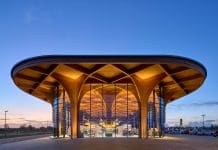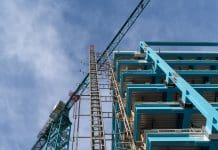New purpose-built modular buildings will restore world-leading research facilities at the University of St Andrews following the fire that destroyed the Biomedical Sciences building earlier this year
The purpose-built modular buildings will accommodate biology teaching and research laboratories alongside bespoke office spaces. The specialist modular units are built by Portakabin at their factory in York. Installation of the new facilities will begin mid-July with construction and specialist internal fit-out works due for completion by mid-October, at a cost of £9m.
On 10 February 2019, a fire ripped through two labs in the Biomedical Sciences (BMS) building on the North Haugh.
Although the building’s compartment design restricted the spread of the blaze, the operation to douse the flames caused extensive water-damage to all areas of the world-leading research facility.
Since then, a specialist University team has worked closely with members of staff from BMS and Portakabin to develop temporary laboratories on North Haugh.
These will ensure the important research at BMS can be re-started while the lengthy operation to recover the building continues.
From 15 July, for a period of 5 days, the 44 Portakabin modular units, which fit together to create a specialist laboratory complex, will be transported from York to St Andrews and craned into position to create the new building. The modular units will be transported by articulated lorry, and this may cause some temporary disruption to traffic on the North Haugh on delivery.
The lorries will have a standard escort vehicle, with Portakabin trained marshals front and back, to guide each delivery slowly and safely through the North Haugh to the site.
Professor Tom Brown, Dean of Science at the University said: “The fire at the Biomedical Sciences building was devastating to not only the researchers, students and staff here in St Andrews, but was also felt across the whole scientific community.
“The construction of the temporary lab facilities ensures that the ground-breaking research carried out within BMS continues and lets the world know that we are open for business, delivering results of real global significance.”
Further development of new chemistry research labs within the Purdie Building at the North Haugh will also take place, at a cost of £3m. Existing biology teaching within the Purdie Building will be relocated to the new modular buildings.














